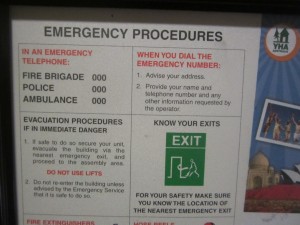During Lewis the Lion’s travels around the world, he’d realised that in different places, there were different telephone numbers for the emergency services, such as the police, medical services or the fire brigade. Often, like in the UK, there would be one universal emergency telephone number with three digits for all the emergency services, e.g. 999 or 112. Although he hoped he would never have the need to use it, he noticed that signs often displayed the emergency numbers in the hostels where he stayed, e.g. This one here that he saw in his hostel in Melbourne, Australia.
This is what he discovered:
Country – Police, Medical Services, Fire Brigade
The USA – 911 for all emergency services
Brazil – 190, 192, 193
Uruguay – 911 for all emergency services
Argentina – 101, 107, 100 (although from some of the main cities 911)
Chile (including Easter Island) – 133, 131, 132
Bolivia – 110, 118, 119 (911 forwards to 110 – the police)
Peru – 105, 117, 116
Ecuador (including the Galápagos Islands) – 911 except from Guayaquil where it is 112
Mexico – 066, 065, 068
New Zealand – 111 for all emergency numbers
Australia – 000 or 112 for all emergency numbers
Can you help Lewis the Lion discover what the emergency numbers are in the next countries he will be visiting on his worldwide journey using this link?
Singapore
Malaysia
Indonesia
Thailand
India
Lewis the Lion realised that knowing the number wasn’t the only important thing though. He realised that in the event that a serious accident should happened, he should also know how to speak clearly, calmly and know the address of where he lived or where he was located. Also, it was useful to record the name of his closest friend or relative in a mobile phone as I.C.E. – In Case of Emergency. His ICE number was for Helen.
Do you know the following important information off by heart too in case of an emergency?
The mobile and/or landline number of your parents, guardian or I.C.E. number?
Your home address?
Any medical conditions and allergies that any close relatives may have?

